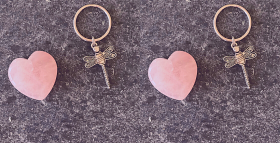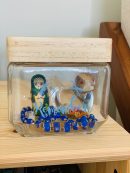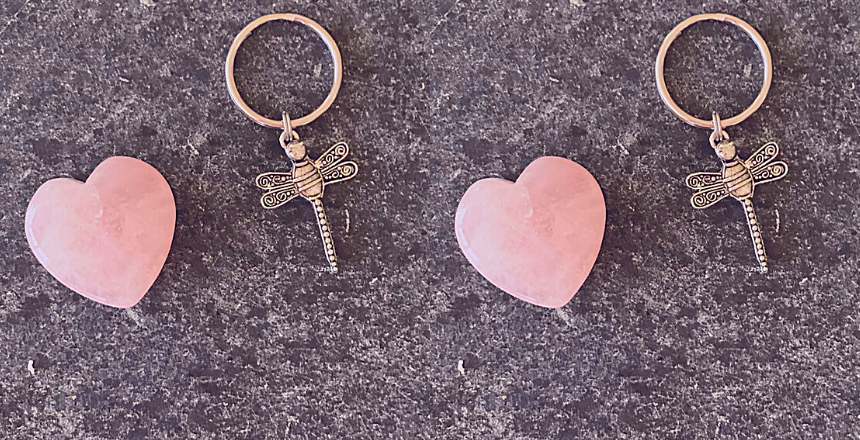
Self-care. It’s become a buzzworthy term throughout social media over the last few years. You know this, too, from the hundreds of thousands of Instagram accounts and bloggers who promote it, as well as articles across all media underscoring its importance. It feels like wherever you turn these days there’s a mandate to Sleep! Hydrate! Breathe! Exercise! Ohm!
I don’t know about you, but for me these blaring reminders can sometimes become stressful and overwhelming, because I feel like I’m supposed to do all of these things, all the time. And of course, those feelings result in the complete opposite of self-care.
And yet…they’re onto something. Self-care is important. Especially in grief, that sneaky monster that so frequently yanks you emotionally and physically in any direction it pleases. Grief — especially early grief — gives us such little control over ourselves, and so it’s vital to control what we actually can by consistently giving ourselves what we need.
So, then, what is self-care? It’s taking a moment to listen to your body and mind and give it what it needs. Good self-care can consistently lead to a better mood, reduced anxiety, and better health. And it doesn’t always have to look like a calm moment of meditation (truth be told, I’m terrible at that). As your ever-present cyber friend who really wants you to look out for your grieving self, and in the throes of a global pandemic at that, I’m not going to try to ram the idea down your throat (who likes that?!) but will tell you a few things that work for me:
Getting out into nature. Daily calendar reminders encourage me to take a walk, go for a bike ride, hike, or even just get outside to look at the sky for a few minutes each day. Studies show that being in nature, or even viewing scenes of it, reduces anger, fear, and stress and increases pleasant feelings. Trust me: Nature never fails.
Snuggling with furry things. Frequently, snuggling with or petting Ziggy, my 30 lb. labradoodle, provides me with a calm and comfort that no human can achieve. Experts have long said dogs know when people are dying or grieving, through body language cues, smells only they can detect, and other ways not yet known. There’s a reason therapy dogs are sent to grief organizations (and funeral homes too!).
Writing. I happen to really enjoy writing. Not everyone does, mostly because they feel pressured to write something good, or at least coherent. But the writing I’m talking about encompasses anything: short journal entries, brain dumps about whatever I’m holding in and need to let go of, things that come to mind at 2 a.m. when I can’t sleep, or memories about my people that I don’t want to forget. In one swift move, my pen (or keyboard) becomes my therapist, and I feel an immediate sense of relief.
Boundaries. I’ve worked hard to remind myself that it’s ok to sleep on things and not feel pressured by others to make a big decision immediately — especially when you are in the throes of grief. Whether that be about what to do with a loved one’s belongings, how to plan a funeral, or even spend time around people who aren’t making you feel as supported as you need. Very few things are as urgent as others make them out to be. If you need to take a step back and mull over how you’d like to proceed, do it.
Humor. You know when you don’t know whether to laugh or cry, and you could honestly go either way, as long as you achieve a release? Whenever I have control over it (which isn’t always the case), I opt for the laughter. I’ve made a file with all my go-to shows, SNL skits and late-night bits that are guaranteed to bring levity. Works (nearly) every time.
It took me a really long time after my parents’ deaths to develop the above routine. I’d so badly wished I could start with a primer in those early days of grief. A couple weeks ago, I received Remembering A Life’s Self-Care Box, which I quickly realized would have served that purpose for me.
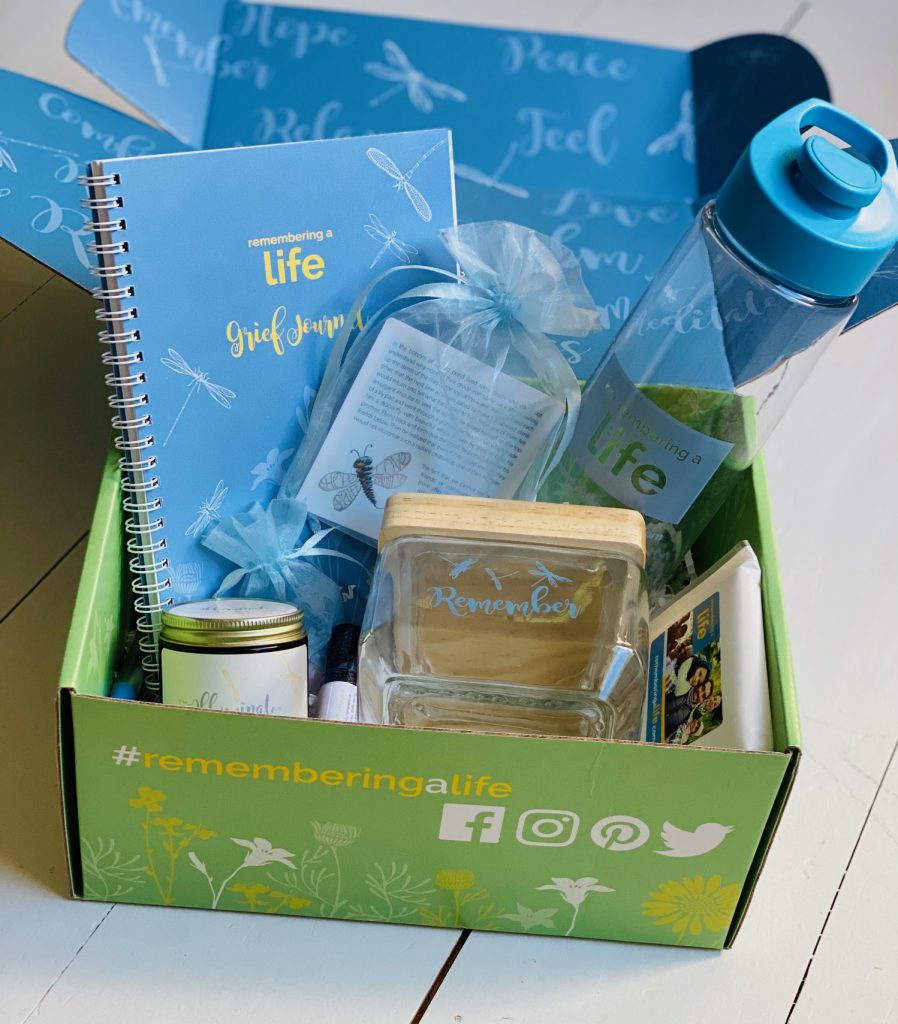
Remembering a Life’s Self-Care box
The items were carefully selected to help the user relax, reflect and remember. And what I really like about it was the suggestion of activities, not a mandate. You can make of it what you want, with your own sensibility, and on your own timeline.
The contents contain a variety of items; just enough for you to get neither bored nor overwhelmed. Here are some of my favorites:
- Grief journal: Before you get scared off, there’s no pressure here! This sweet little book has a terrific assortment of guided prompts, creative ideas for how to use it beyond the written word (think doodling, painting), and (non-cheesy) quotes about grief that really resonate.
- Memory jar: Frequently in my early grief I found myself pushing even the happy memories below the surface. My visceral reaction was that it would be painful to have them front and center. The thing is, though, that when I do allow myself to pull out items that remind me of my parents — favorite photos, a silky scarf, — I just end up feeling comforted. I really love that this kit provides a beautiful glass and wood container for me to do that in a nice display (and large enough to contain my mom’s favorite glycerine bar of soap…the one that screams a certain profanity).
- Aromatherapy candle and essential oil: What was nice about finding these is that they aren’t items I would specifically purchase for myself, and now that I have them, I think they smell really, really good (pear and redwood? Yes, please) and spark instant calm.
- A reusable box: I realize this may not sound as exciting to you as it does to me, but I am one of those people who really appreciates a high-quality box.
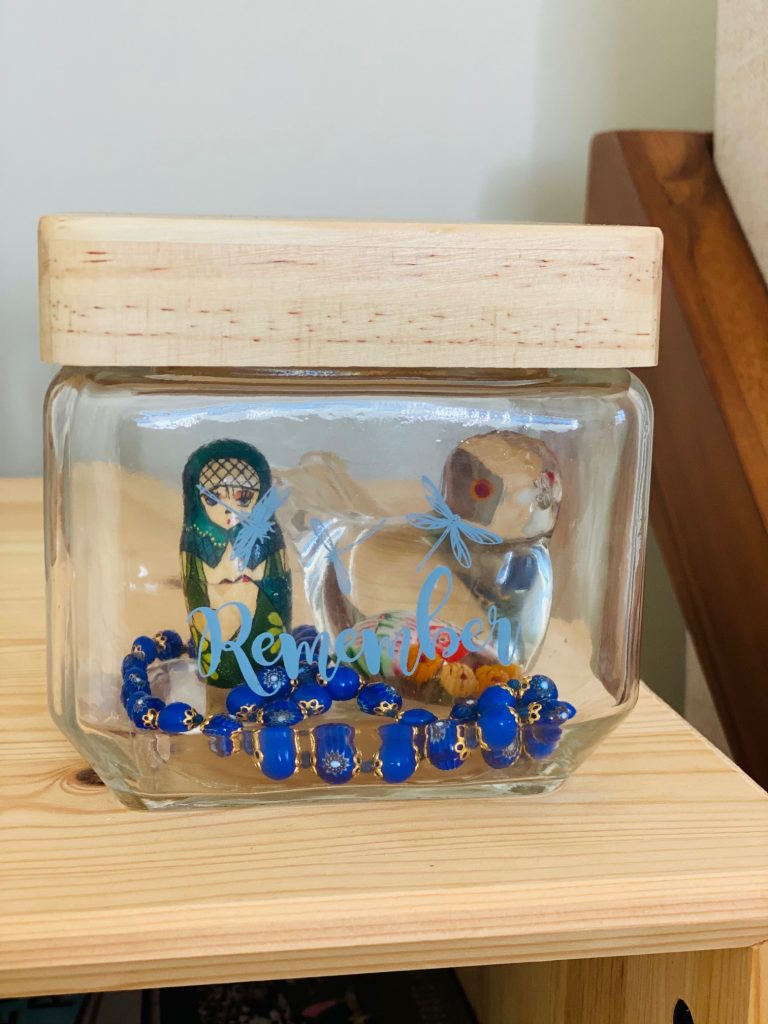
My memory jar hosts a rotating display of meaningful objects
The Self-Care Box is one of many resources and tools found on Remembering A Life’s website that helps individuals and families beautifully memorialize a life well-lived, whether a death has just occurred or an individual and their family wishes to plan in advance. The site also offers guidance on where to begin the planning process, the kinds of decisions that loved ones will make and the many options available to make a tribute personal and meaningful.
We’ll be doing a giveaway of these wonderful boxes this week, so keep an eye out for more info on our Instagram account!
This post is sponsored by the National Funeral Directors Association. As always, all opinions and ideas are entirely our own. Lead image: a rose quartz heart stone and dragonfly keychain, both included in the self care box.

